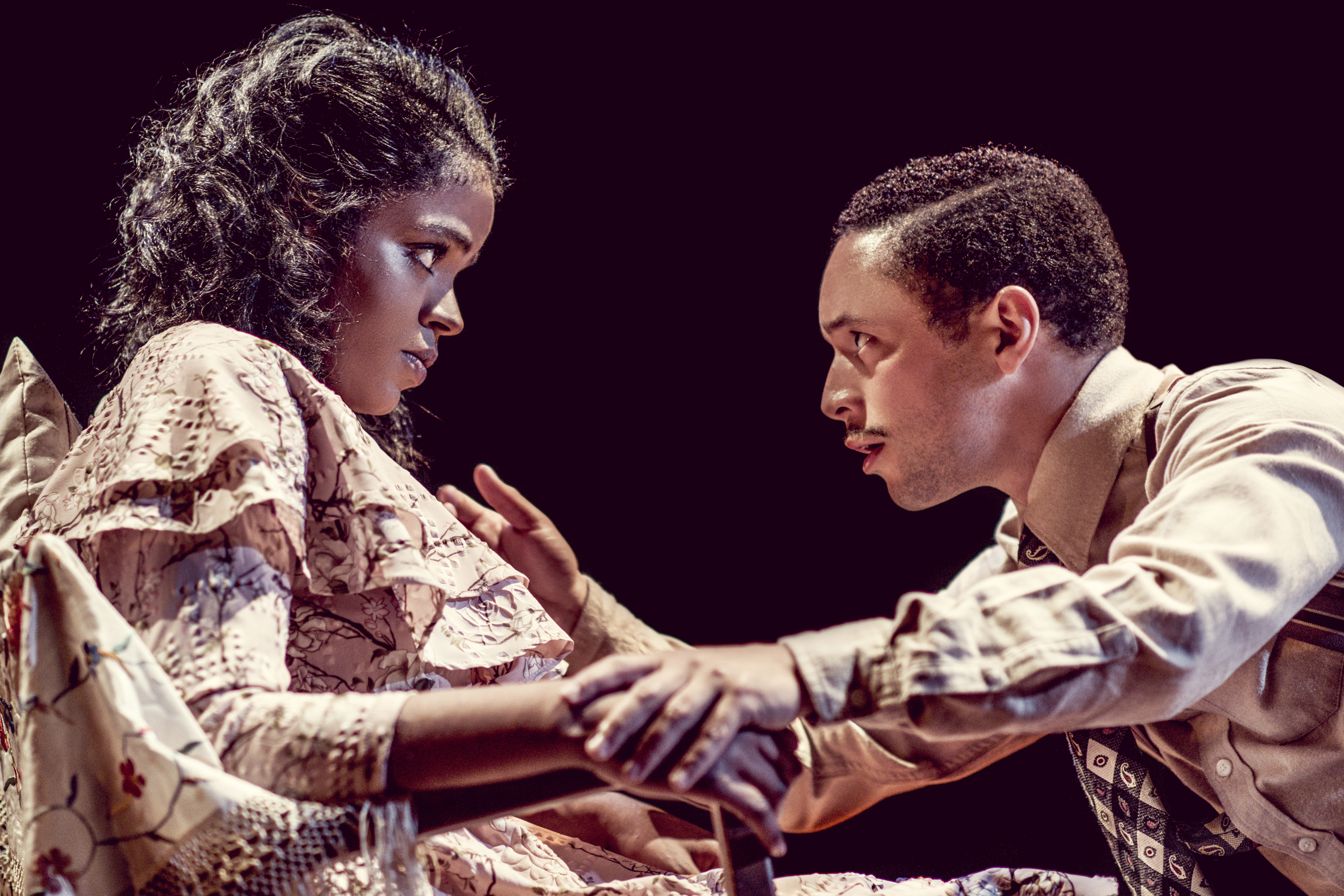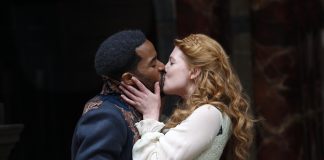Directed by Femi Elufowoju jr, this play by Tennessee Williams – often described as a ‘great American Classic’ – is a stark reminder of the disempowering aspects of a failed patriarchy, and how some of those elements can continue to corrode a family – or a community – long after the ‘final axe has been swung’.
Alas, due to casting decisions, this play’s iteration brings to mind other concerns.
The eponymous collection of inanimate objects referred to in the title is (of course) a metaphor; it refers to the delicate and fragile state visited upon those whom society declares to be broken, damaged and – in some way – defective.
It centres around The Wingfields, a family in St. Louis, Missouri; a city in America’s deep South in 1937.
The matriarch is ‘Amanda’ (Lesley Ewen), a woman in a state of perpetual grief (bordering on hysteria), due to her husband – and father to her children – having left her many years before. She exists in a state somewhere between suspended animation and arrested development; the former being represented by her belief that her best days (long gone) occurred when ‘gentlemen callers’ frequented her family home to court her; the latter state being represented by the regular – and presumably ever-more exaggerated – retellings of these stories.
In her world, freedom comes only through attempting to recreate the mental and social tyrannies of a plantation-led past and/or the patriarchal present. In her world – and that of her family – there is no possibility (or need) of a re-imagined future.
The daughter is Laura (Naima Swaleh), a 24-year-old woman whose childhood illness has left her with a limp, but for whom ‘shyness’ is the more crippling affliction.
Lauren ‘escapes’ through her glass menagerie collection, as well as her ‘long walks’ away from her mother’s mental strait-jacketing / tyranny.
Tom (Michael Abubakar) is the 23-year-old son, de-facto breadwinner and ‘man of the house’, narrator, and playwright surrogate. Tom works in a dead-end warehouse job, only escaping through constant trips to the movies, through imbibing alcohol, writing poetry, and his plans to become a seaman.
Finally, the departed patriarch (never seen in the flesh) watches silently – judgmentally – over them all, in the form of a photograph; a ghoulish reminder of ‘Christmases past, present and future’. It is he that is viewed as the symbol for both those in the household (duty, safety, enslavement), and for the play itself (freedom)… at least, until the denouement.
The truth is it is the mother’s choices– as well as the fear and self-diminishment that she transmits – that have forged them all (including the absent father).
This leads to her nagging Tom into inviting a work-colleague to dinner, in the hope of getting Laura romantically ensnared.
Jim O’Connor (Charlie Maher), the ‘gentleman caller’ whose presence takes up most of the second act, is not merely a symbol of escape – he personifies it; firstly, by not quite being present throughout the proceedings and, secondly – in the moments that he is forced to be so – finding a way to control, or evade, the madness.
He does this by either by telling the family what they want to hear (flirting with a deluded Amanda), or by just-plain lying (inventing his girlfriend, ‘Betty’).
As with all of Tennessee Williams’ plays, it is very much ‘of its time’; the Southern strictures that existed in the American South between the world wars seem – not just symbolically restrictive – but theatrically cumbersome.
One area in which this production misses a trick is in the casting of Jim O’Connor. All the actors here have been exchanged, from their original caucasian representations, into evidently BAME actors…except the ‘gentleman caller’.
In this era of ‘heightened racial sensitivity’ [has it always been so?], to cast the only character (viewed – by a disgruntled, disaffected and disempowered BAME family – as a symbol of attainment, assimilation and/or freedom) as a caucasian actor, seems…problematic.
This is not to disparage Charlie Maher’s superb acting; nor is it to denigrate the rest of the excellent cast (especially Michael Abubakar as Tom).
In this casting, there is now a sense that O’Connor may wish to extricate himself from the possibility of romantic entanglement with Laura simply because of race. If this was not intended, then it certainly muddies the waters. Perhaps a more specifically ironic social point was being made in the casting; in which case, I would have preferred it hadn’t been attempted, and that an all-black cast was presented. If one wishes to attempt ‘colour-blind’ casting, then do it for all – unless there is good reason to sign-post specific roles.
By making the ‘black family’ the predominant toxic environment to be escaped from (at all costs) – and the path to redemption symbolised by the good-looking, intelligent, witty, charming, upwardly mobile ‘White saviour’ – I believe the director may have… missed.
Yes, Jim is peddling second-hand rhetoric, empty platitudes and bland disingenuousness, but – in this age of visual and symbolic simplicity (how ironic) – I feel this to be of secondary importance.
At the risk of being terribly old-fashioned (or simplistically post-modern) – it’s difficult to overlook the one major flaw that compromises so much good work.
Certainly, Rebecca Brewer’s set design superbly utilises the limited/limiting space to create both the interior and exterior of the family home. Yvonne Gilbert’s sound design, Arnim Friess’ s lighting, Joel Trill’s dialect coaching and Kemi Durosinmi’s movement direction are also superb.
As with all of Tennessee Williams’ work, this play relies greatly on symbolism.
Indeed, as all symbolism becomes increasingly more powerful the closer a prescribed imagery is clung to, it is also true that – if we’re not vigilant – we may think ourselves as little more than living, breathing metaphors: ciphers without agency.
This is almost the case for three of the main characters in this play.
I fear that – with the casting – this production has similarly boxed itself in.






























